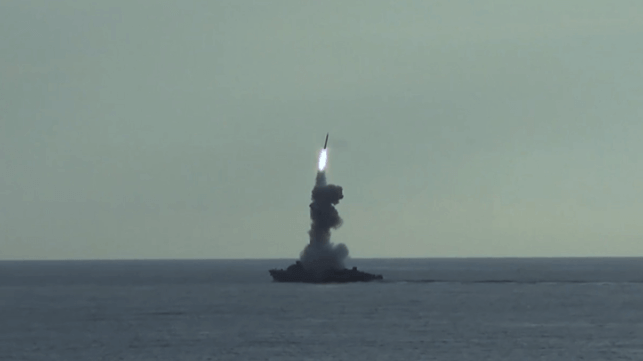Russia Admits Attacking Port of Odesa Just After Signing Grain Deal

On Friday, hours after promising not to attack Ukrainian grain exports, Russia attacked the grain export port of Odesa. It denied responsibility in a discussion with mediators, then acknowledged the attack Sunday on state media.
It’s really preposterous when ???????? tells ???????? that it had nothing to do with the missile attack against the Odessa port. Kalibr cruise missiles are sophisticated weapons launched from ships and submarines of the ???????? navy and from nowhere else. pic.twitter.com/cTzzeWobb8
— Carl Bildt (@carlbildt) July 23, 2022
In the pact signed on Friday, the parties agreed that they "will not undertake any attack against . . . port facilities engaged in this initiative" for a period of at least 120 days.
Hours later, Russian missiles struck the port of Odesa, one of three designated grain ports in the agreement. Russia immediately denied responsibility.
"In our contact with Russia, the Russians told us that they had absolutely nothing to do with this attack and that they were examining the issue very closely and in detail," Turkish Defense Minister Hulusai Akar said on Saturday.
The narrative changed the following day. "Kalibr missiles destroyed military infrastructure in the port of Odessa, with a high-precision strike," clarified Maria Zakharova, spokesperson for the Russian foreign ministry. State network RT asserted that the strike hit a Ukrainian "military vessel and a stockpile of Harpoon missiles."
Ukraine and its allies used the attack as an example of the risk of any peace agreement with Russia. "Yesterday, the Istanbul agreement on Ukrainian grain exports via Black Sea ports, facilitated by UN and Turkish efforts, was reached. Today, Russian missiles hit port of Odesa," said Kaja Kallas, Prime Minister of Estonia. "That’s all you need to know about deals with Russia."
Russia's willingness to attack a designated grain port may not reassure the shipowners, seafarers and insurers who are considering whether to call in Ukraine. Even before the strike, the availability of war risk cover for a voyage in and out of Odesa was uncertain. Insurers are well aware that Russia has attacked multiple merchant vessels over the course of the war (including one struck twice), and the chances of encountering a naval mine are a legitimate concern.
It is not the first time that Russian forces have struck a Ukrainian grain port. A Russian cruise missile strike destroyed grain silos and warehouses at the Nika-Tera agricultural dry bulk complex in Mykolaiv in early June, taking out food export capacity of about six million tonnes per year.
????Russian army hit a grain terminal in #Mykolaiv. #UkraineRussiaWar pic.twitter.com/64lF4nr7g5
— MilitaryLand.net (@Militarylandnet) June 4, 2022
The underlying rationale for the attack on Odesa is not known, but when communicating with the Russian public, Russian officials have made clear that the constriction of Ukrainian food exports is a deliberate policy to advance Russia's strategic objectives. Last month, top state TV executive Margarita Simonyan told an economic forum that the confidants in her circle "hope for a famine" in order to apply pressure on the West and secure sanctions relief (below).
Margarita #Simonyan, editor-in-chief of RT, says frankly that she hopes for a famine. By organizing it, they hope to force the West to become friends with #Russia. pic.twitter.com/zRYmGFeKhv
— NEXTA (@nexta_tv) June 21, 2022

that matters most
Get the latest maritime news delivered to your inbox daily.
This statement of purpose is in active circulation in Russian state media. On Saturday, Andrey Kartapolov, head of the State Duma Defense Committee, said on the Rossiya-1 broadcast network that "Putin is using food, heat, lighting, gas as a weapon. We'll probably start using children's toys that way too."
However, when communicating to audiences abroad - particularly in grain-importing nations in the Global South, which are most affected by the blockade - the Russian government has denied weaponizing food and has blamed grain shortages on NATO sanctions instead.
